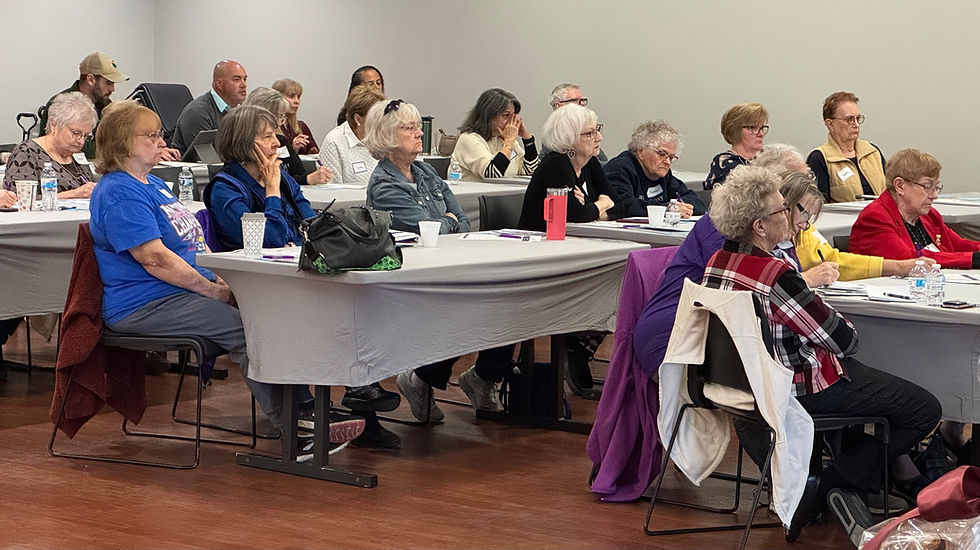March 2025 Brain Health & Aging Tips | Senior Truth Series
- Julie Spaulding

- Mar 26, 2025
- 4 min read
Updated: Sep 3, 2025
The Aging Brain: What to Expect As We Age
What’s normal when it comes to brain changes and what’s not?
Senior Truth Series brought together professionals from KU’s Alzheimer’s Disease Research Center, the Parkinson’s Foundation, and other community organizations to break down what happens to our brains as we age, what early signs to watch for, and what research is being done to help us protect brain health.
Understanding the Differences Between Normal and Abnormal Brain Aging
A big focus was helping attendees understand the difference between “normal” brain aging and something more serious like dementia or Parkinson’s disease.
Dementia is an umbrella term for memory loss and cognitive decline that interferes with daily life. Under that umbrella are conditions like Alzheimer’s, vascular dementia, Lewy body dementia, and frontotemporal dementia.
Alzheimer’s is the most common form of dementia and the risk of developing it increases with age.
Parkinson’s disease is often thought of as a movement disorder, but many people also experience cognitive changes. The umbrella term for movement-related symptoms is Parkinsonism, with Parkinson’s disease being the most common type.
You could essentially describe Parkinson’s like the Tin Man from The Wizard of Oz: stiff, slow-moving, and needing a bit of help to function smoothly.
Research and Hope on the Horizon
Kelly from KU Alzheimer’s shared several exciting clinical trials underway, including studies on:
Avocados and cognitive function (yes, daily guacamole might be helping)
The benefits of hot tub heat therapy
How sleep, metabolism, and even smell may be tied to cognitive decline
A future peanut butter trial that’s expected to launch soon
These studies aim to not only treat but possibly prevent Alzheimer’s in the future. She emphasized that while we don’t have a cure yet, research is moving fast, and early detection makes a huge difference in treatment success.
On the Parkinson’s side, Dr. Muhammad highlighted groundbreaking research on skin-based diagnostic tests that can detect signs of Parkinson’s before symptoms appear. Treatments are also evolving, with promising work on vaccines and infusion therapies that could slow or halt disease progression.
What You Can Do Right Now for Healthy Aging
While no one offered a magic cure, there are habits that can support brain health such as:
Exercise regularly
Eat a balanced diet (especially those good fats like avocado and peanut butter)
Get quality sleep
Stay socially connected
Avoid head injuries (wear helmets and fall-proof your home)
Be curious and keep learning
These simple steps, especially when done consistently, can make a real impact. As Dr. Muhammad put it, “You may not need to do all 30 things, but if you do 10 or 12 of them well, it can help lower your risk.”
Additional Tips and Education Around Healthy Brain Aging
1. The difference between Alzheimer’s, dementia, and Parkinson’s
Dementia is the umbrella term for conditions that affect memory and thinking.
Alzheimer’s is the most common type of dementia.
Parkinson’s disease is primarily a movement disorder, but many people also develop cognitive symptoms over time.
Parkinsonism is the umbrella term for conditions that present with Parkinson-like symptoms.
2. Environmental and lifestyle risk factors
Parkinson’s research is beginning to confirm what many have long suspected: exposure to pesticides, viruses, head injuries, and even heavy metals may increase risk.
Living on farms, being exposed to sprayed chemicals, and certain viral infections (like hepatitis C or salmonella) have all been linked to increased Parkinson’s risk.
For dementia, head injuries, social isolation, and cardiovascular conditions can raise the risk of cognitive decline.
3. Promising research and diagnostic advances
Important research highlights around diagnostic advances included:
For Alzheimer’s: studies on metabolism, avocados, peanut butter, hot tubs (heat therapy), smell tests, and menopause.
For Parkinson’s: a new skin biopsy test with 93% accuracy, vaccine trials, stem cell advancements, and new infusion treatments that may slow disease progression.
We encourage you to consider joining research studies, as participation helps drive discovery, and many studies offer compensation or free health screenings.
4. Access to care and specialists
Many people don’t realize they can and should ask for specialists.
Only 9% of people with Parkinson’s in the U.S. are seeing a movement disorder specialist.
General neurologists may not be familiar with all 25+ treatment options available.
Access to quality care can significantly impact quality of life and how long someone lives with these diseases.
5. The power of small changes
Prevention isn’t a one-size-fits-all plan, but consistent, small efforts make a big difference. You don’t need to do all 30 healthy things. But if you can consistently do 10 or 12 of them, your brain will thank you.
Final Thoughts on Overcoming The Aging Process
Brain changes are not just part of getting older; they are often the result of long-term health patterns and deserve attention. Early detection matters, and so does surrounding yourself with a good support system. With enough effort, you can mitigate some of the effects of mental aging and keep your mind sharp for years to come.




















Comments